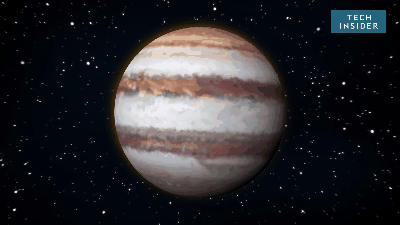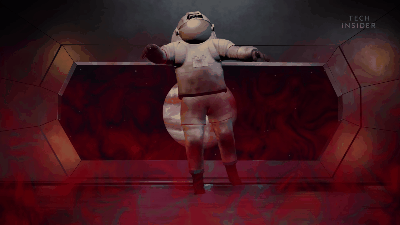What if we try to land on Jupiter?
The best way to investigate a planet is to land on it. But with Jupiter, the story is not simple.
For those who do not know,. For ease of comparison, the diameter of Jupiter is about 22 times greater than our Earth.
How to discover about a planet? The best way is to land on that planet. That's why humans must find ways to land on the Moon, or send probes to Venus, Mars, Europa (Jupiter's moon), and Enceladus (Saturn's moon).
But what about landing on Jupiter? Jupiter is one. So, let the spacecraft land here like you land on a cloud on Earth. There is no hard surface for you to land, just below the air layer, deep to . endless.

Jupiter is a giant gas planet.
The question is: There is no answer point, can you just fly through this giant planet? In fact, you don't even get halfway through.
Let's find out why and see if there is any place on Jupiter that can be a stop for your spacecraft!
The first thing to note before exploring Jupiter is that the planet's atmosphere has no oxygen, instead of hydrogen and helium. So make sure you prepare enough oxygen to survive.

Make sure the spacecraft is able to withstand extremely high temperatures and extreme pressure.
One thing that is equally worrying is the scorching heat on the surface of Jupiter , so don't forget to equip your spacecraft with a good air conditioner.
Close to Jupiter, the spacecraft will be attracted by gravity of this planet with the speed . 177.027km / h.
You will soon meet a thick layer of gas and touch it as if crashing into a wall. But this gas layer does not stop your spacecraft from falling.
The next 3 minutes, you will reach the top of the cloud layer to 250km thick. This is where you can clearly feel Jupiter's rotation - the planet that is the fastest in the solar system.
A day on Jupiter is only 10 hours on Earth. That rotation force causes wind currents of up to 483km / h.

Galileo ships approach Jupiter.
Falling about 120.7km, you will reach the deepest limit that the explorer ship ever entered.
This is the depth that Galileo probe has achieved when discovering Jupiter in 1995.
Unfortunately, the probe named this great astronomer only managed 58 minutes before losing the signal, and was torn apart by 100 times the pressure of the Earth's surface.
Here, the vision is 0, you have to show the lights to see around.
Dropping another 620km, the pressure increased by 1,150 times. You won't be able to survive if your spacecraft is not under the same pressure as Bathyscaphe Trieste - the deepest submarine in the world.
Deeper, terrible pressure and high temperatures will cause any spacecraft to explode.

This is when you have to use lights to illuminate your surroundings.
Anyway, just imagine that it doesn't happen. The reward for you when you reach this depth is the secrets of Jupiter that no one has ever known.
Unfortunately, you will not be able to share this with anyone because radio waves have been completely annihilated.

The heat at this time can melt tungsten.
At a depth of 4,023km, the temperature is 3.371 degrees Celsius - the heat can melt tungsten - the highest melting element in the universe until now.
So your journey has lasted at least 12 hours, and in front of it is Jupiter's core zone.
The pressure at the core zone is 2 million times that of the Earth, and the temperature is hotter than the Sun. Here, hydrogen no longer exists in gaseous form but turns into liquid, called metal hydrogen.

You will fall into an ocean of giant liquid metal hydrogen.
You will fall into an ocean of giant liquid metal hydrogen. The thrust of the liquid reduces the impact of gravity.
Imagine yourself as a yo-yo, pulled down and then pushed up again. And when these two forces are balanced, you drift freely in the middle of Jupiter, unable to enter nor escape.

You are like a yo-yo, pulled down and then pushed up again.
This means that, even if our technology is enough to create a spacecraft that can withstand all the forces of impact in the world - from enormous pressure to extreme temperature - then entering Jupiter still a suicidal act. Simply because you can only go in, not to escape.
- Overview of Jupiter
- NASA wants to land on Jupiter's Europa satellite
- For the first time, humans can discover Jupiter's deepest mystery
- The Juno probe sends the first image of Jupiter to Earth
- What happens if Jupiter doesn't exist?
- Tonight is the best time to see Jupiter
- Jupiter and Saturn will shine beautifully in the sky from today
- Jupiter once swallowed 10 times the planet Earth
- A series of wonderful images of Jupiter are sent from the Juno-NASA ship
- Photographs of Jupiter's surface look exactly like a water-picture
- The amazing thing that NASA's Juno spacecraft has just made
- Discover 10 more microscopic satellites orbiting Jupiter
 Van Allen's belt and evidence that the Apollo 11 mission to the Moon was myth
Van Allen's belt and evidence that the Apollo 11 mission to the Moon was myth The levels of civilization in the universe (Kardashev scale)
The levels of civilization in the universe (Kardashev scale) Today Mars, the sun and the Earth are aligned
Today Mars, the sun and the Earth are aligned The Amazon owner announced a secret plan to build a space base for thousands of people
The Amazon owner announced a secret plan to build a space base for thousands of people